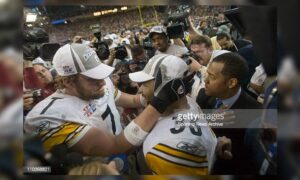Ben Roethlisberger has a reputation for being frequently injured, and for missing time because of it. While that had been less true of late, the Pittsburgh Steelers quarterback suffered what was by far the most significant injury of his career in the second game of the 2019 season, which caused him to miss the rest of the year in its entirety.
More accurately—or at least we can assume—his injury was the result of an accumulated wear and tear on his throwing elbow over a period of years, perhaps reflected in the fact that he had been taking days off in practice during the week for years. But either way, the point is that it was significant, and required season-ending surgery.
And makes him a favorite to win the Comeback Player of the Year Award, which had previously been won by Tommy Maddox back in 2002. Two years later, Roethlisberger was drafted, took over for Maddox in Week Two, and hasn’t looked back since.
Ever since he began throwing in February, the betting odds have been favoring him as among the most likely to win the award, but Rob Gronkowski’s unretirement and Cam Newton signing with the New England Patriots have made it more competitive.
Bleacher Report is among the outlets who view the 17th-year quarterback as one of the most likely players to win the award this year. Chris Roling included him in an article highlighting some of the other likely candidates, including Gronkowski and Newton, but also Matthew Stafford, J.J. Watt, and A.J. Green.
More often than not, a quarterback ends up winning the award, provided that there is an available candidate. Under normal circumstances, no player makes a greater contribution to his team than the quarterback position, so that’s why we regularly see them earn this award—for whatever it’s worth.
I’m sure Roethlisberger doesn’t really care at all about winning the Comeback Player of the Year Award, outside of the fact that it would probably be a guarantee that he would win in the event that he were able to lead the Steelers to the Super Bowl.
That’s what he cares about, year in and year out. He is entirely on the same page as the organization, which views every season that doesn’t end in a championship trophy being added to the display case as a failure—even a season in which they don’t have their quarterback.








